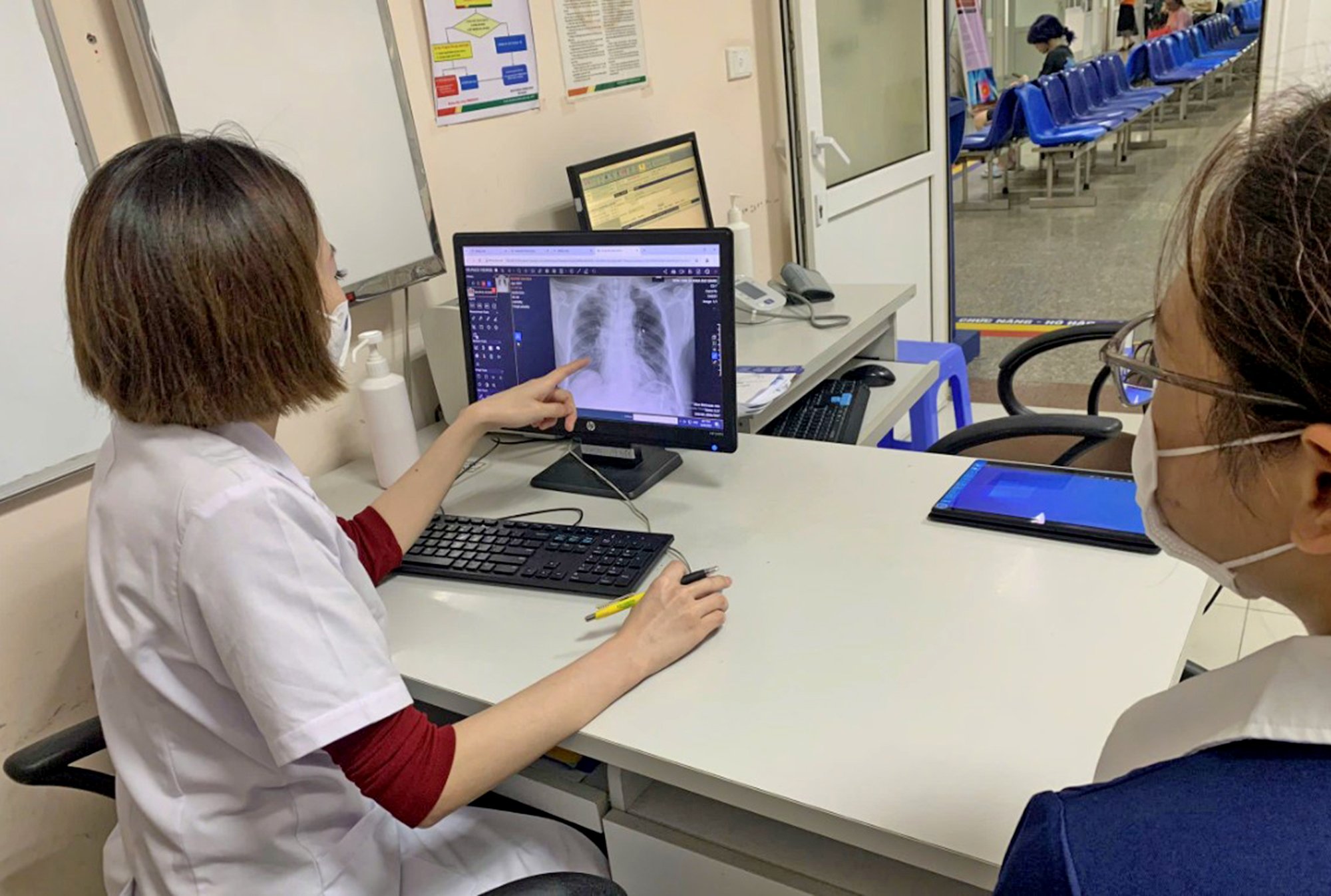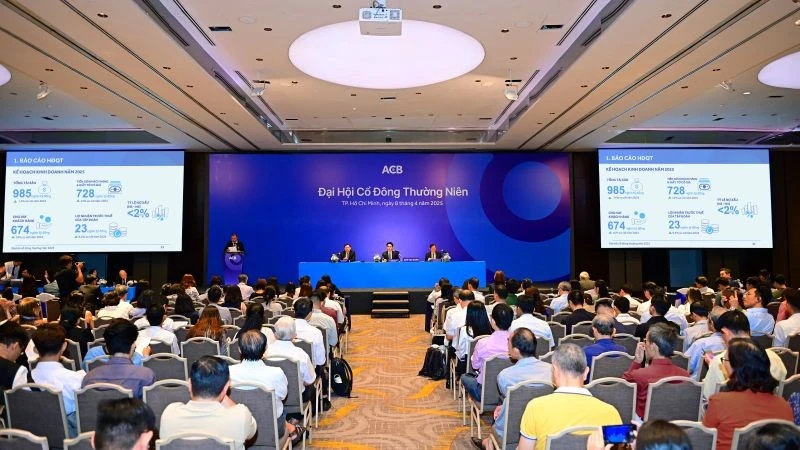Accurate appointment reminders to the minute
Having been treated for diabetes for the past 8 years at Duc Giang General Hospital, Mr. Nguyen Tru (65 years old, Long Bien, Hanoi) said: "My underlying disease requires regular check-ups.
I arrived on time, put my chip-embedded citizen ID card and health insurance card into the registration machine and in less than 30 seconds I was admitted for examination. After the blood test, the results were sent via text message and the doctor called me in to read the results and prescribe a prescription.

The doctor reads the X-ray results on the computer to the patient.
When he left, Mr. Tru only held a prescription in his hand, not a bunch of medical records like before.
According to Dr. Nguyen Van Thuong, Director of Duc Giang General Hospital, in recent years, digital transformation applications have created a breakthrough in management work, while improving the quality of medical examination and treatment at the hospital.
Since 2020, the hospital has used the PACS system (picture archiving and communication) in X-rays. When patients have X-ray results, the system will transfer them to clinics and treatment departments, helping with early diagnosis and intervention.
PACS also helps improve the quality of medical examination and treatment, due to clearer images, more accurate viewing of lesions and measurement of lesion size, and determination of lesion density.
The results are saved on the system with better image quality, so after several years, the hospital can still use them for consultation.
The hospital also has an App for doctors and nurses to monitor inpatients. In addition, online registration helps reduce the load and manage the number of patients, and cashless payments have also been implemented at the hospital for many years.
Currently, 40% of the hospital's daily patients are scheduled for appointments and reminders are accurate to the minute.
At Bach Mai Hospital, although it has just been implemented, according to Associate Professor, Dr. Vu Van Giap, Deputy Director of the hospital, in 2024, the hospital will strive with many effective projects, especially in digital transformation, applying artificial intelligence (AI) to examination and treatment.
According to Mr. Giap, currently, doctors only need a tablet to contain all data, from examination and X-ray results, to patient medical records, medications used, etc.
In particular, digital signatures have been applied throughout the system, contributing to the convenience of patient record creation, freeing up time for administrative procedures during medical examination and treatment.
AI application for early cancer detection
Mr. Giap added that not only does digital transformation occur in all business processes, but the application of AI in examination and treatment is also effective as many pathological signs cannot be detected if examination is performed according to conventional procedures.
Mr. Giap cited that recently a 49-year-old male patient came to Bach Mai Hospital for a general examination with underlying conditions of high blood pressure and myocardial infarction, and had 3 stents placed.
The patient showed no symptoms, and an X-ray only showed a hazy mass in the lungs. Other paraclinical tests such as bronchoscopy and pharyngoscopy were performed, but nothing remarkable was found.
However, when the patient's indicators were entered into the software and AI supported analysis, it was determined that the patient had damage to the right lung lobe and was at risk of malignant cancer.
Chest CT scan results confirmed that the patient had early signs of lung cancer.
Thanks to early detection, this patient was able to have surgery to remove the entire lung tumor, perform histopathology, and skip the lung biopsy step (an invasive biopsy can cause bleeding and pneumothorax).
According to Associate Professor, Dr. Dao Viet Hang, Endoscopy Center, Hanoi Medical University Hospital, Head of the Global Network of Young Vietnamese Intellectuals, artificial intelligence is increasingly being applied strongly in medicine, helping to screen for diseases more easily.
In addition to X-ray films, many hospitals have integrated software with artificial intelligence algorithms to help detect and diagnose liver cancer on CT-Scanner or magnetic resonance (such as diagnosing the stage of rectal cancer). In the field of endoscopy and pathology, there are also many products that help diagnose and reduce errors in lesions better.
Currently there are some applications for patients with diabetes, high blood pressure, hepatitis B patients...
Or in the field of digestion, AI has helped remind patients to take medication, provide questionnaires to stratify patient risk, and find warning signs when patients are at risk of complications.
This creates a connection channel for patients to find medical facilities or doctors sooner.
Source: https://www.baogiaothong.vn/ung-dung-ai-phat-hien-som-ung-thu-192241217142354958.htm































![[Photo] Visiting Cu Chi Tunnels - a heroic underground feat](https://vstatic.vietnam.vn/vietnam/resource/IMAGE/2025/4/8/06cb489403514b878768dd7262daba0b)





























































Comment (0)